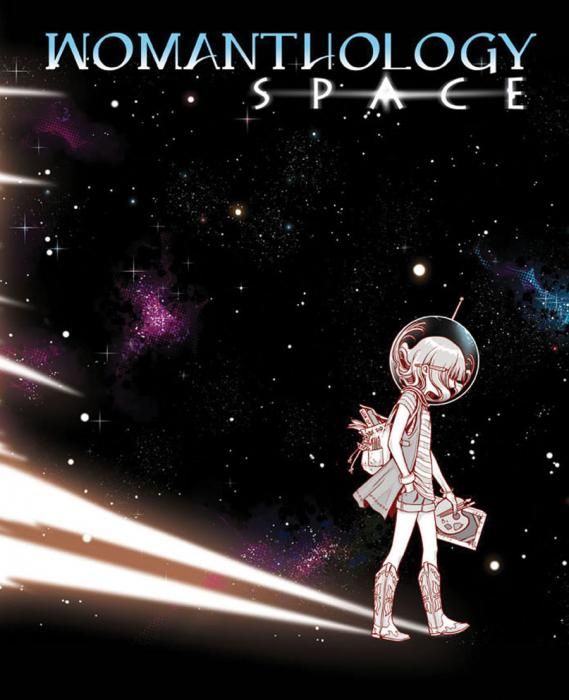"Womanthology: Space" #1 follows up on Renae DeLiz's phenomenally successful Kickstarter project, "Womanthology: Heroic" from earlier in 2012. There are five space-themed stories by female creators in this twenty-two page issue, making for a slim mixed bag. A very short comics story is an unforgiving, difficult form, and most creators have little experience with its demand for extremely compressed storytelling.
"Waiting for Mr. Roboto" by Bonnie Burton and Jessica Hickman makes a bad first impression for "Womanthology: Space" because it doesn't feels fragmentary and slight. The storytelling pace feels smooth, but it's much too leisurely, wasting space that should be furthering characterization or plot tension. Burton's dialogue is goofy but snappy, and Hickman's art is clean and bubbly, but this breezy riff on robots and romance feels pointless because it ends as soon as it begins.
The second six-pager, "Dead Again," by Sandy King Carpenter and Tanja Wooten, also has flawed pacing. Of all of the writers in this issue, Carpenter strives the most for pathos and characterization. The ending panel is haunting, and the anguish of the main male character about a memory or phantom woman is palpable. Wooten's art is hyper-detailed, with atmospheric pauses, but much of the detail feels unnecessary and impedes the flow of the story. Carpenter and Wooten's panel transitions are awkward enough that it's hard to know what -- or where and when -- events are going on. This confusion adds to the dreamlike disorientation of the story, and the brutal ending only adds a feeling of "huh?" Carpenter and Wooten attempt to fit too a big a story into a small page count, which ultimately sinks it. Without more grounding, this haunted space story also feels weirdly weightless, except as a vignette. Unlike "Waiting For Mr. Roboto," it has emotional punch, which makes its pacing missteps even more frustrating.
Of the three longer six-page stories, "Scaling Heaven" by Alison Ross and Stephanie Hans is by far the most successful. The prose is sharp and lovely with precise, vivid expressions like "sealed up tight in a tin can and flung into the dark," and the iconic art depicts rapid events and conveys a feeling of epic scale. The pacing moves the reader across time and two nations comfortably. There are only second-long glimpses of each of the characters, but their voices are distinctive and resonant, and the flash we get of them is like a good Nike commercial. That's a compliment; sports commercials often make optimal, effective use of only a few seconds and include a nice range of bodies and faces.
Both the art and the writing create a feeling of wide-open space, ambition and possibility, and the last page has that space opera grandeur -- the wonder-inducing combination of the night sky and human desire. In its title, "Scaling Heaven" touches on the idea of gods high in heaven, and in humanity's strange mix of humility and hubris in daring to fly. Out of all the stories in "Womanthology: Space" #1, this one best encompasses the themes of women and space. It doesn't just happen to occur in outer space instead of in the Wild West or in a jungle; it's a story about going outward, going up and away into limitless sky.
The fourth piece, "The Adventures of Princess Plutonia" by Ming Doyle is only two pages, but it has the full arc of rising action, climax and denouement, although hilariously compressed. It's a delightfully campy, silly piece that parodies old romance and space comics from the 1950s. Jordie Bellaire does an excellent job of retro, lurid coloring. Doyle's prose is deliberately overwrought with over-the-top phrasing like "foul grasp" and "gelatinauts" that wield "slime beams." This hugely enjoyable, dorky Rescue-the-Guy story makes great use of its mere 11 panels, quickly world-building two planets, an intergalactic conflict, a chain of command and a romance with subversive power dynamics.
The last piece, "Space Girls" by Stacie Ponder is also only two pages, but instead of a complete tale, it's the beginning of a story "to be continued in the next thrilling episode." The all-female spaceship crew has engaging camaraderie and Ponder has an easy-to-follow, cute and cartoony style.
"Womanthology: Space" #1 showcases a broad variety of art styles and approaches to the theme of Space, but like most anthologies, the offerings are uneven.

